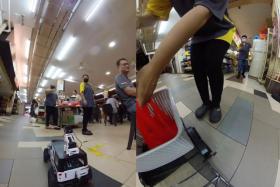New rules to prevent telecom cables from being cut
The authorities will be holding telecom companies and earthworks contractors to a higher standard from June 1 to reduce incidents of underground telecom cables being cut, of which there have been 26 cases in the past three years.
For instance, joint meetings must be held at the worksite among telcos, earthworks contractors and a licensed telecom cable detection worker, said the Infocomm Media Development Authority (IMDA) yesterday in announcing a new framework.
This is to ensure that there are no discrepancies between the service layout plan, the cable detection worker's report and worksite conditions.
Such joint meetings were not spelt out clearly in the past, with varying rules set for contractors carrying out such earthworks.
IMDA developed the new framework with the 22 telecom firms after some contractors were found to have cut corners by not hiring a licensed telecom cable detection worker to locate underground cables.
Under the newly clarified rules, telcos and contractors will be required to inspect trial holes dug together to verify the location of all cables and determine whether diversion works are needed.There have been 26 cable-cut incidents since February 2016.
Most have been due to earthworks contractors not following procedures and failing to exercise due diligence, IMDA said.
A cut fibre optic cable in Jurong West disrupted Internet and fixed voice services for almost 30 hours in April 2017, the longest such outage to date.
Under the Telecommunications Act, those found guilty of damaging telecom cables while carrying out earthworks can be fined up to $1 million and jailed for up to five years.
Fibre network operators welcomed the new requirements.
NetLink Trust's chief operating officer Chye Hoon Pin said: "The measures will further reduce accidental damage to the critical fibre network infrastructure which can cause unnecessary inconvenience to service providers and their customers."
Singapore Contractors Association president Kenneth Loo agreed that the increased clarity was a step in the right direction but called for a further streamlining of approval processes.
"No one wants to damage anything on purpose and more clarity is always good. But earthworks are only one stage of any construction project and it would be more productive if there was a one-stop authority that oversees all the requirements and can approve the commencement of works in one go."
Get The New Paper on your phone with the free TNP app. Download from the Apple App Store or Google Play Store now


